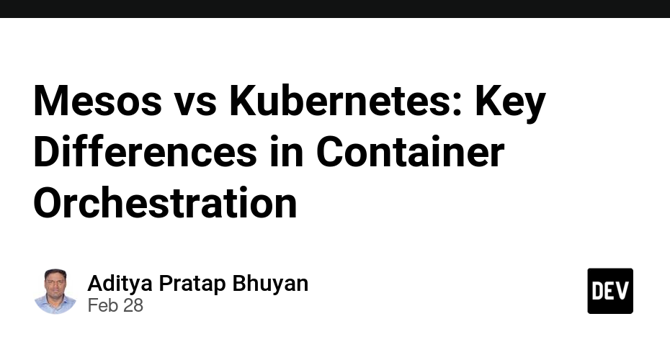Dev
1M
86

Image Credit: Dev
Mesos vs Kubernetes: Key Differences in Container Orchestration
- Mesos and Kubernetes are two prominent container orchestration platforms with distinct differences in architecture, resource management, and use cases.
- Apache Mesos is a general-purpose cluster manager that can handle various workloads beyond containers, offering flexibility and scalability for hybrid environments.
- Kubernetes is an open-source platform focused on automating deployment, scaling, and management of containerized applications, making it ideal for cloud-native environments.
- Mesos abstracts an entire data center into a single pool of resources and relies on external frameworks like Marathon for container orchestration, while Kubernetes is container-native with built-in features for managing containers.
- Mesos excels in resource management across a wide range of workloads, while Kubernetes provides native support for scheduling and managing Pods, the smallest deployable units.
- Kubernetes offers a rich ecosystem and community support, making it the default choice for containerized applications, while Mesos has a smaller ecosystem and is more focused on general-purpose resource management.
- Both platforms are highly scalable, with Mesos handling various workloads simultaneously and Kubernetes focusing specifically on containerized applications.
- Mesos is best suited for hybrid environments managing a mix of workloads, while Kubernetes is tailored for modern containerized applications like microservices and cloud-native architectures.
- Ultimately, the choice between Mesos and Kubernetes depends on the specific needs of the organization, with Mesos offering flexibility and scalability for diverse workloads, and Kubernetes excelling in container orchestration and management.
- Understanding the unique requirements of the workload is crucial in selecting the most suitable platform, whether it be Mesos for hybrid environments or Kubernetes for container-centric environments.
- Both Mesos and Kubernetes provide robust solutions for modern application management and scaling, catering to different organizational needs and priorities.
Read Full Article
5 Likes
For uninterrupted reading, download the app